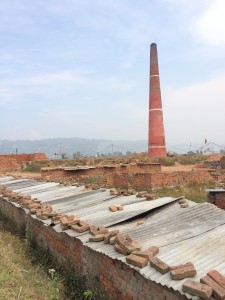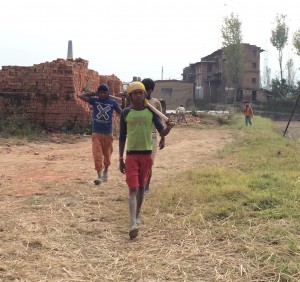The rain has ended. There air is now cool. Rice fields have been harvested. Dasain and Tihar festivals have come and gone. For thousands living in Nepal the changing season means work begins in the brick kilns. For children of brick kiln employees, the changing season means leaving behind their homes, schools, and a feeling of security. The changing season means leaving behind their childhood.
The migrants have started the long journey from their homes and villages traveling from the poorest and most remote areas of Nepal to Kathmandu Valley. For the next six months they will be working tirelessly from sun up until sun down in the harsh, dust-filled brick kilns. Not only do brick kiln employees endure unforgiving hours and conditions, but their children are also forced into working in the tough, hazardous environment.
I visited two brick kilns in Bhaktapur that CONCERN works with and watched as families that have already arrived, till the land that was recently rice paddy fields. People were busy chopping, digging, and burning the remains of the roots and prepared the fields to become smooth areas for bricks to dry. Families labored together building their temporary homes made of bricks and tin roofs that will provide modest shelter through the chilly working season.
In the distance young boys were diligently hauling broken bricks from last year’s season to make room for the new batches of bricks. A group of toddlers played on a large sand pile near a water ditch used to make the clay for the bricks as women prepared tea over an open fire.
By next week over 1,100 employees and their families will labor and live at these brick kilns. A major upheaval in the lives of families for the next six months for a promise made to their broker to make enough bricks in the hopes to be paid by the end of the season.
Out of the 1,100 people working and living at the two brick kilns over 300 are children. These children pay the heaviest price. Their education is halted and they are often forced to work alongside their families, exploited and vulnerable. For these children the changing season means being stripped of their childhood.
Posted By Gisele Bolton
Posted Nov 20th, 2014




2 Comments
Katy
November 21, 2014
Gisele this is your best blog yet! I really enjoyed your descriptions of the kilns as they begin the season.
iain
November 22, 2014
Another good blog. Look forward to more insights, as you get to know the kilns and the workers. Theses a HUGE issue….